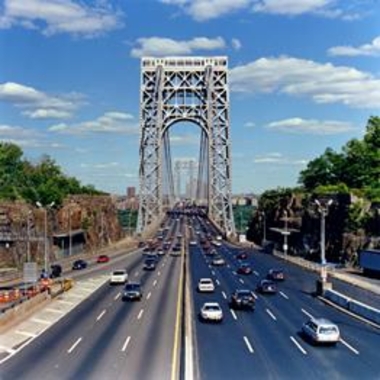Christie fires aide, apologizes for traffic jams

Trenton, N.J. (AP) — Gov. Chris Christie on Thursday apologized for highway lane closures apparently ordered by his aides as political retribution, said he had "no knowledge or involvement" in what happened and sought to assure New Jerseyans the actions are not typical of the way his administration does business.
"This is the exception, not the rule," he told a news conference.
Christie, who had previously assured the public his staff had no involvement in the road closings, said he had fired Deputy Chief of Staff Bridget Anne Kelly "because she lied to me."
Kelly was the latest casualty in a widening scandal that threatens to upend Christie's second term and likely run for president in 2016. Documents suggest she arranged traffic jams to punish Fort Lee's mayor for not endorsing Christie.
The revelations thrust a regional transportation issue into a national conversation raising new questions about the ambitious governor's leadership on the eve of a second term designed to jumpstart his road to the White House.
The U.S. attorney in New Jersey, Paul Fishman, said he was "reviewing the matter to determine whether a federal law was implicated." The legislature is also investigating.
Christie on Thursday focused repeatedly not on the closures themselves but on how upset he was that his staff didn't tell him the truth when asked about the closures.
"I was blindsided," he said during a more than 90-minute news conference, speaking in a quieter tone than is typical for him.
"What did I do wrong to have these folks think it was OK to lie to me?" he asked.
Email and text messages obtained Wednesday by The Associated Press and other news organizations indicated that the lane closings were retribution against the Democratic mayor of Fort Lee for not endorsing Christie last fall.
"Time for some traffic problems in Fort Lee," Kelly wrote in August in a message to David Wildstein, a top Christie appointee on the Port Authority of New York and New Jersey.
A few weeks later, Wildstein closed two of three lanes connecting Fort Lee to the heavily-traveled George Washington Bridge, which runs between New Jersey and New York City. He also told him he didn't want him working any longer as a consultant to the Republican Governors Association, which Christie heads this year.
The messages do not directly implicate Christie, but they contradicted his assertions that the closings were not punitive and that his staff was not involved.
Christie acknowledged Thursday that was a lie, because his staff didn't tell him what they had done.
He also said he had "no knowledge or involvement in this issue, in its planning or execution" and was stunned by the "abject stupidity that was shown." He said he was "embarrassed and humiliated" by his staff. At the same time, he said he accepted responsibility.
"I am responsible for what happened. I am sad to report to the people of New Jersey that we fell short," he said.
Fort Lee Mayor Mark Sokolich called it "appalling" that the traffic jams appear to have been deliberately created.
Christie said he would go to Fort Lee on Thursday to apologize to Sokolich. What he said he found most puzzling was that he had never known his campaign was seeking the mayor's endorsement.
"This guy was never on my radar," he said.
Kelly hasn't commented. Christie said he hadn't spoken to her since the emails were released, saying he didn't want to be accused of trying to influence a possible witness.
Besides firing Kelly, the governor asked a second onetime aide, former campaign manager Bill Stepien, to withdraw from a bid to become the next state GOP chairman. He said he was disturbed by the "callous indifference" displayed by Stepien in the emails released Wednesday.
Beyond the specifics of the lane closures, critics suggest the incident reflects a darker side of Christie's brand of politics that contradicts the image he'd like to project as he eyes the presidency.
The governor repeatedly sidestepped criticism that he bullied adversaries in an overwhelming re-election victory in November.
"I am not a bully," he said.
Facing a little-known and underfunded opponent, he cast himself as a different kind of Republican: a compromising, consensus builder who ultimately earned strong support from minorities, union members and even many Democrats.
It was described as the opening argument for Christie's prospective White House run. That argument is now clouded, at least temporarily, during one of the most important transitions of his political career.
In less than two weeks, he is scheduled to celebrate his second inauguration in the shadow of the Statue of Liberty on historic Ellis Island, a symbolic beginning to a second term designed to expand Christie's bipartisan appeal. He also is expected to unveil his second-term priorities — solidifying his presidential resume — in a state-of-the-state address later this month, while beginning an aggressive national travel schedule as chairman of the Republican Governors Association.
Wildstein, a childhood friend of the governor, is scheduled to testify later Thursday before a state Assembly committee. He asked a judge Thursday to quash the subpoena, but the judge refused to do so.
Democratic National Committee chair Debbie Wasserman-Schultz said the "revelations are troubling for any public official." But she said: "They also indicate what we've come to expect from Gov. Christie — when people oppose him, he exacts retribution. When people question him, he belittles and snidely jokes. And when anyone dares to look into his administration, he bullies and attacks."
___
Associated Press writer Steve Peoples in Washington contributed to this report.
by Angela Delli Santi, Associated Press and
Geoff Mulvihill, Associated Press
Copyright 2014 The Associated Press. All rights reserved. This material may not be published, broadcast, rewritten or redistributed.
The Gayly – January 9, 2014 @ 2:00pm





